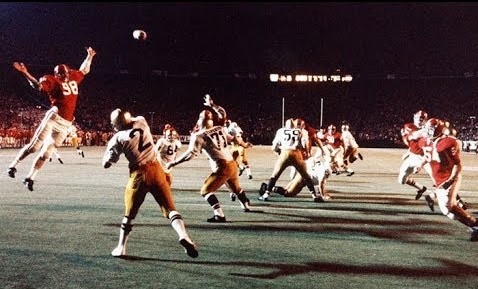
By: Phil Houk of Fighting Irish Preview Reprinted from IrishIllustrated.com January 2007
Tom Clements refers to it as “the pass”, but Robin Weber calls it “the catch”. Whatever your perspective, if you are a Notre Dame fan you know that Robin Weber played a critical role in the Irish winning the 1973 National Championship.
Weber, who was a bruising 6-5 265, is a native of Dallas, Texas and could have gone to school anywhere, “Everybody, John McKay, Darrell Royal, Frank Broyles…. was after me. But I didn’t want to play for conference championships, I wanted to play for National Championships and when Ara offered me the chance I knew that was the guy that would get it done,” commented Weber, who was in New Orleans this week for the Sugar Bowl.
While most fan’s remember his big catch in the 1973 Sugar Bowl, most fans don’t know that the first ever play of his college career, came against USC that season and he just happened to throw a block which helped spring Eric Penick’s famous 85 yard TD run in that game. It was a play which is pointed at as a turning point in the ND national title run that year. “It was my first ever play and I thought to myself, this is easy!”
After the USC game Weber saw more and more action, but exclusively in two TE formations and always as a run blocker. “Until the Sugar Bowl I had never caught a pass from Tom Clements, not in practice, not even in warm ups.” Weber recalls.
Bowl preparations under Parseghian were much more restrictive in 1973 then they are today. “We were on campus and practiced the entire Christmas break. We stayed at the Morris Inn, and ate Christmas dinner in the Monogram Club.” The Loftus center was years away from being built, and South Bend was blanketed with snow. “We practiced in the Joyce Center everyday in our stocking feet”.
But preparing for a big game was a Parseghian specialty. Commenting on Ara’s reputation as a master organizer who always paid great attention to detail, Weber said, “You wanted to work as hard for him as he worked for you.”
The Irish arrived in New Orleans a little nervous about the fact that they had been practicing indoors at half speed. But from the moment the game against Alabama started it was apparent that the Irish were focused and at a peak.
The lead changed hands 6 times and the Irish were holding on to a precarious 24-23 lead. With 3:00 left on the clock, the Irish found themselves backed up on their own 2 yard line. Two running plays netted 5 yards and on third and 5, Weber was in for what was planned as another run up the middle.
As the teams set, Weber saw the defensive tackle move offside and the whistle blew. “On the film you can see me stand up and celebrate because I was sure we would be awarded a first down on an Alabama penalty, and we could run the clock out and would win the game. But then I found out that (All-American TE, Dave) Casper had jumped first on the other side.” Now 3rd and 8, Weber was sure he would be taken out of the game and he waited for SE Pete Demmerle to come in for him. Demmerle never came in though and with 2:08 on the clock, the stage was set for “The catch”.
Weber tells the story of the sequence of events which led to his great play. “In the span of a few moments I went from the excitement of having thought we had won the game to suddenly realizing I would be running my first pass pattern at Notre Dame.”
He was called on to run a flag pattern which would result in him clearing out his side of the field for a planned pass underneath. But he put a move on a defender who thought the imposing TE was going to block him and broke free down field. Weber thought to himself, “I hope he (Clements) sees this!” The next thing he knew he was fielding the pass near the Alabama sideline and had gained 35 yards.
After landing on the ground he first saw all the red jerseys and then he looked for penalty flags. Then he saw the Bear. “Coach Bryant was heading towards me and he did not have a happy look on his face!” Weber came out of the game and the Irish ran the clock out.
Robin Weber became a part of Irish football lore.
Weber has put his Notre Dame degree to good use and is a successful businessman in his hometown of Dallas. There he runs a commercial real estate and warehousing business called Weber Commercial Real Estate Services.
What advice does he have for the Irish players who will make up the 2007 program? “My mantra when I was playing was there are no excuses, just go out there and get the job done.”

[…] that. Robin Weber, recipient of the most famous pass Notre Dame’s very famous football history, said in 2007 that he’d never even caught one from quarterback Tom Clements in practice or pregame […]
[…] that. Robin Weber, recipient of the most famous pass Notre Dame’s very famous football history, said in 2007 that he’d never even caught one from quarterback Tom Clements in practice or pregame […]
[…] Robin Weber, recipient of the most famous pass Notre Dame’s very famous football history, said in 2007 that he’d never even caught one from quarterback Tom Clements in practice or pregame […]